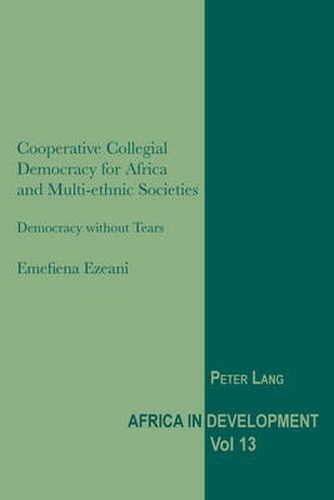Readings Newsletter
Become a Readings Member to make your shopping experience even easier.
Sign in or sign up for free!
You’re not far away from qualifying for FREE standard shipping within Australia
You’ve qualified for FREE standard shipping within Australia
The cart is loading…






This title is printed to order. This book may have been self-published. If so, we cannot guarantee the quality of the content. In the main most books will have gone through the editing process however some may not. We therefore suggest that you be aware of this before ordering this book. If in doubt check either the author or publisher’s details as we are unable to accept any returns unless they are faulty. Please contact us if you have any questions.
It is no longer a matter of debate to state that the practice of ‘democracy’ in different African nations is almost always experienced through violence or something near to it. The principal question addressed by this work is, ‘Why are many African countries finding it difficult to practise democracy without tears ?’ Though this unique work recognises a number of factors as contributing to the pitiable democratic experience of many African states, the liberal party model of democracy is identified as a major political obstacle which not only impedes democratisation, but also fails to address significant national questions in plural societies. Instead of acting as an attenuating force, the liberal party system tends to intensify the negative roles of other dependent socio-political variables in instituting and consolidating democracy in multi-ethnic societies. In light of this, this work recommends a cooperative, instead of a competitive method of government formation - a ‘Cooperative Collegial Democracy’ - for African societies and any multi-ethnic society. This is a party-less, peaceful and overtly fair political system which is imbued with the qualities needed to resolve national questions and which constrains the incompetent and corrupt from emerging as political leaders, thus ensuring competent leadership and establishing functional and non-destabilising democracies in African or other multi-ethnic states.
$9.00 standard shipping within Australia
FREE standard shipping within Australia for orders over $100.00
Express & International shipping calculated at checkout
This title is printed to order. This book may have been self-published. If so, we cannot guarantee the quality of the content. In the main most books will have gone through the editing process however some may not. We therefore suggest that you be aware of this before ordering this book. If in doubt check either the author or publisher’s details as we are unable to accept any returns unless they are faulty. Please contact us if you have any questions.
It is no longer a matter of debate to state that the practice of ‘democracy’ in different African nations is almost always experienced through violence or something near to it. The principal question addressed by this work is, ‘Why are many African countries finding it difficult to practise democracy without tears ?’ Though this unique work recognises a number of factors as contributing to the pitiable democratic experience of many African states, the liberal party model of democracy is identified as a major political obstacle which not only impedes democratisation, but also fails to address significant national questions in plural societies. Instead of acting as an attenuating force, the liberal party system tends to intensify the negative roles of other dependent socio-political variables in instituting and consolidating democracy in multi-ethnic societies. In light of this, this work recommends a cooperative, instead of a competitive method of government formation - a ‘Cooperative Collegial Democracy’ - for African societies and any multi-ethnic society. This is a party-less, peaceful and overtly fair political system which is imbued with the qualities needed to resolve national questions and which constrains the incompetent and corrupt from emerging as political leaders, thus ensuring competent leadership and establishing functional and non-destabilising democracies in African or other multi-ethnic states.